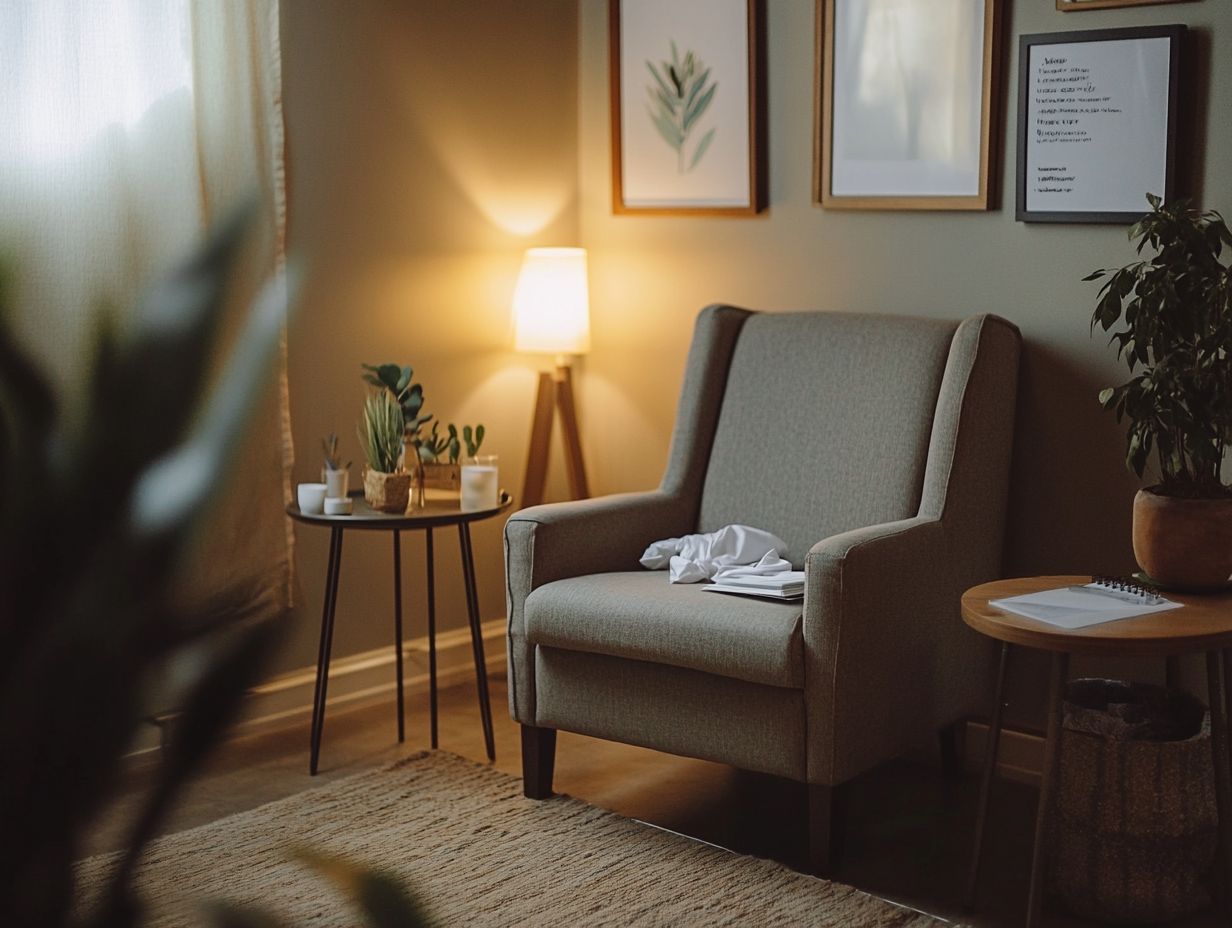What Are My Options for Anxiety Counseling?
Anxiety can be an overwhelming presence in your life, yet understanding your counseling options can truly transform your journey toward feeling better. This is especially true when considering various treatment options that support your mental health.
This article delves into what anxiety counseling involves, the various types of anxiety disorders, and the array of treatment options available to you, including cognitive behavioral therapy, medications, and alternative therapies such as mindfulness practices.
It also guides you in selecting the right counseling approach and highlights valuable support resources, including online therapy options like BetterHelp. Discover how you can start your journey to a calmer, more joyful life!
Contents
Key Takeaways:

- Anxiety counseling is a form of therapy designed to help individuals cope with and manage anxiety disorders.
- There are various types of anxiety disorders, each with unique symptoms and treatment options.
- When choosing anxiety counseling, factors such as qualifications, approach, and personal comfort should be considered.
Understanding Anxiety Counseling
Understanding anxiety counseling is crucial for anyone seeking relief from anxiety disorders, as these can greatly impact your daily life and feelings. Symptoms related to stress and social anxiety can be particularly challenging.
This type of counseling encompasses various therapeutic techniques, including psychotherapy (a type of therapy that helps you talk through your feelings), supportive counseling, and cognitive behavioral therapy (CBT). These approaches are designed to alleviate symptoms like social anxiety disorder and stress, while also focusing on effective stress management.
By working collaboratively with mental health professionals, you can explore your treatment options, participate in therapy sessions, and receive ongoing support from a primary care provider or a well-structured support group that encourages coping strategies.
This holistic approach helps you understand anxiety better, empowering you to manage your condition effectively through techniques such as mindfulness and journaling.
What is Anxiety Counseling?
Anxiety counseling is a specialized form of psychotherapy crafted to help you manage anxiety symptoms and enhance your emotional regulation.
This therapeutic approach is designed to equip you with effective coping strategies, empowering you to confront and navigate the challenges that anxiety presents. Through a variety of methods such as cognitive-behavioral therapy (CBT) or mindfulness techniques practitioners will guide you on a transformative journey of self-discovery and empowerment.
The goals of this process extend beyond mere symptom relief; they include enhancing your emotional resilience, fostering a deeper understanding of your personal triggers, and promoting healthier thought patterns. By employing tailored frameworks, anxiety counseling aims to pave the way for lasting emotional well-being, ultimately enabling you to lead a more fulfilling life.
Types of Anxiety Disorders
Anxiety disorders, as detailed in the DSM-5, encompass a spectrum of conditions that can greatly impact your daily life and feelings. This includes panic disorder, where you may experience sudden and intense episodes of panic; obsessive-compulsive disorder, characterized by persistent, unwanted thoughts and compulsive behaviors; post-traumatic stress disorder, which arises from traumatic experiences; and social anxiety disorder, defined by an overwhelming fear of social interactions.
Each of these disorders manifests distinct symptoms, necessitating personalized treatment strategies, which may include medications, psychotherapy, and effective coping skills.
With the right support, you can overcome anxiety and embrace a life filled with peace and happiness.
Identifying and Differentiating Anxiety Disorders
Identifying and differentiating anxiety disorders is essential for ensuring an accurate diagnosis and effective treatment. Various anxiety disorders often share overlapping yet distinct symptoms, making a thorough psychological evaluation crucial.
Your journey typically starts with a thorough evaluation by a primary care provider, who may then refer you to a mental health professional for a more in-depth assessment. This helps you get the right diagnosis quickly and ensures that you receive the best treatment options available.
During psychological evaluations, clinicians utilize standardized questionnaires and structured interviews to measure the severity and frequency of your symptoms. The process aims to differentiate between various anxiety disorders such as generalized anxiety disorder, panic disorder, and social anxiety disorder by diving into the specific triggers and contexts that induce your distress, including potential factors like social isolation and stress.
As practitioners gather insights from both your self-reports and collateral information from family or friends, a clearer understanding of your experiences emerges. This comprehensive view enables targeted interventions that effectively address your unique challenges, setting the stage for meaningful progress.
Treatment Options for Anxiety

Treatment options for anxiety are both diverse and tailored to meet your unique needs. These blend cognitive behavioral therapy, medications, and lifestyle adjustments, including regular physical activity and sleep hygiene practices.
Cognitive behavioral therapy (CBT) often serves as the first line of defense, giving you the power to understand and reframe the unhelpful thought patterns tied to your anxiety.
Healthcare providers may also prescribe medications like antidepressants, including selective serotonin reuptake inhibitors (SSRIs). They may incorporate techniques such as exposure therapy, a method where you gradually face your fears in a safe way, and relaxation strategies to help you manage anxiety symptoms more effectively.
Explore these treatment options today to take control of your anxiety!
Cognitive Behavioral Therapy
Cognitive Behavioral Therapy (CBT) stands as a premier treatment approach for anxiety. It is designed to assist you in identifying and transforming the unhelpful thought patterns that contribute to your symptoms, thereby fostering emotional well-being.
With its structured methodology, CBT invites you to actively engage in examining your thought patterns, challenge irrational beliefs, and restructure negative thinking. You ll learn to confront your fears directly instead of avoiding them, which fosters resilience and adaptability in the face of anxiety, promoting long-term anxiety relief.
CBT employs a variety of coping strategies, including exposure therapy, relaxation techniques, and mindfulness exercises. All of these play a crucial role in stress management and emotional regulation.
These techniques give you the power to manage anxiety effectively and reclaim your sense of control. By nurturing self-awareness and equipping you with practical tools, this therapeutic approach not only alleviates your anxiety symptoms but also enhances your overall emotional well-being, promoting healthier thought processes in your everyday life.
Medication
Medications are vital for addressing anxiety disorders. Antidepressants are often the most prescribed options, especially for panic disorder and obsessive-compulsive disorder.
These medications like selective serotonin reuptake inhibitors (SSRIs) and serotonin-norepinephrine reuptake inhibitors (SNRIs) target neurotransmitters in your brain. They help improve your mood and reduce feelings of anxiety, which is crucial for your mental health.
Beyond SSRIs and SNRIs, you might explore other classes of antidepressants, such as tricyclics or monoamine oxidase inhibitors (MAOIs), if first-line treatments don’t quite hit the mark for you, ensuring an effective plan to manage anxiety.
Talking openly with a mental health provider is essential, as your experience with anxiety is distinctly your own. It’s vital to communicate your unique symptoms and challenges. This underscores the need for tailored approaches that ensure effective treatment and management, leading you toward a more balanced life, ultimately enhancing your emotional well-being.
Alternative Therapies
Alternative therapies for anxiety, such as mindfulness practices, herbal remedies, and support groups, present you with valuable pathways for relief and emotional well-being, offering anxiety relief alongside traditional treatment options.
These approaches can serve as effective complements to traditional treatments like medication and cognitive behavioral therapy, enhancing your overall mental health and providing additional support resources.
Mindfulness practices, for example, guide you to focus on the present moment, helping to tame those racing thoughts and alleviate stress, which is crucial for managing anxiety symptoms effectively.
Herbal remedies, such as chamomile and valerian root, have shown promise in studies for their calming effects and could potentially ease your anxiety symptoms, serving as a natural alternative for anxiety relief.
Support groups offer a sense of community and shared experience, allowing you to connect with others who are navigating similar challenges. This can be incredibly validating and uplifting, fostering a strong therapeutic alliance.
These options create a holistic strategy for managing anxiety, giving you the power to discover what resonates best with your individual needs, including necessary lifestyle changes.
Choosing the Right Anxiety Counseling
Choosing the right anxiety counseling is a pivotal step toward effective treatment, and it demands your careful consideration of several key factors, such as therapy options, potential lifestyle changes, and the qualifications of mental health professionals.
Establishing a strong therapeutic alliance can greatly enhance the effectiveness of your counseling experience. It’s vital to choose a counselor who aligns with your emotional needs. Therefore, seek out a provider whose approach resonates with your specific needs and preferences.
Factors to Consider

When selecting anxiety counseling, consider several key factors, including the type of support group available, whether lifestyle changes are woven into the treatment approach, and the availability of online therapy resources like BetterHelp.
It’s essential to assess the qualifications and experience of the counselor, ensuring they specialize in anxiety disorders and have a solid understanding of the DSM-5 criteria.
A supportive environment, such as a well-structured support group, can profoundly enhance your journey to recovery, offering shared experiences and much-needed encouragement to help you develop effective coping skills.
Incorporating lifestyle changes like regular exercise, mindfulness practices, and balanced nutrition can significantly enrich a comprehensive treatment plan. This holistic strategy not only addresses the psychological dimensions of anxiety but also fosters overall well-being, laying a solid foundation for lasting improvement.
Finding Support and Resources
Finding support and resources is your first step toward conquering anxiety! You have countless options at your disposal, such as connecting with mental health providers or exploring online therapy solutions like BetterHelp.
Embracing these resources can significantly enhance your journey toward well-being. Don t wait! Start exploring these resources today for a brighter tomorrow.
Support Groups and Online Resources
Support groups and online resources provide very helpful community connections and effective anxiety relief strategies. They help you navigate anxiety disorders.
Join us at in-person gatherings, where members share experiences and coping techniques. You can also connect through virtual forums to share your journey!
Some groups focus on specific types of anxiety, such as social anxiety or generalized anxiety disorder. This allows you to seek tailored support that resonates with your unique challenges.
Online resources include apps and dedicated websites for mindfulness or cognitive-behavioral techniques. These tools are accessible whenever you need them.
By fostering a sense of belonging and shared understanding, these support systems empower you. You can approach your anxiety journey with greater confidence and resilience.
Frequently Asked Questions
What Are My Options for Anxiety Counseling?
You can choose from several counseling options. These include individual therapy, group therapy, and online counseling.
What is Individual Therapy for Anxiety?
Individual therapy involves working one-on-one with a licensed therapist. This helps you address anxiety and develop coping strategies.
What is Group Therapy for Anxiety?
Group therapy includes sessions with a small group of individuals who also face anxiety. This creates a supportive and understanding environment.
What is Online Counseling for Anxiety?
Online counseling, or teletherapy, lets you receive counseling from home. It typically involves video or phone sessions with a licensed therapist.
Are There Any Natural Options for Anxiety Counseling?
Besides therapy, consider natural options like mindfulness techniques and exercise. Herbal supplements may also help manage symptoms.
How Do I Know Which Option is Best for Me?
The best counseling option varies by individual. Consult with a mental health professional to find the right treatment for your needs.






